-
Child Support and Bankruptcy
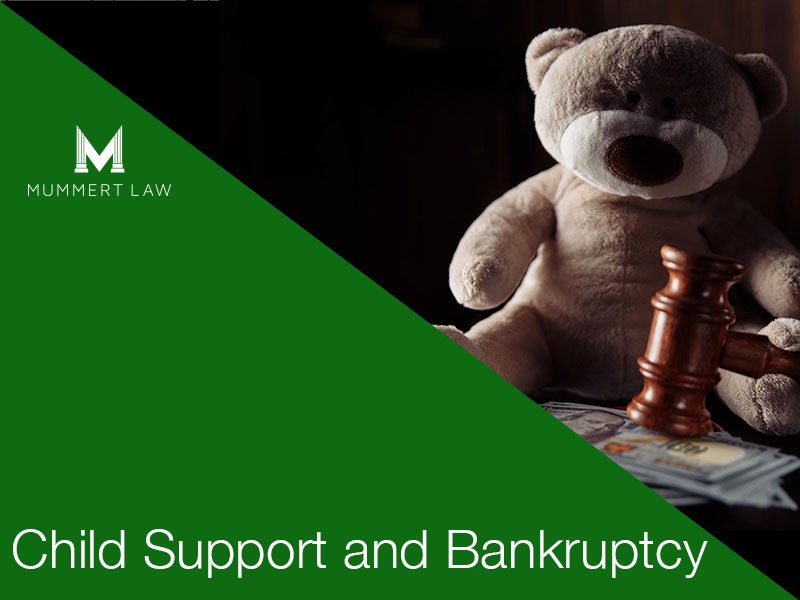
Child Support And Bankruptcy
Some parents paying or receiving Child Support find themselves in a financial situation that requires intervention. Bankruptcy is one way people can escape debt and face a better financial future.
Suppose you owe child support and plan to file bankruptcy, or your child’s co-parent is, it’s essential to understand how bankruptcy can affect child support. Bankruptcy will not change the mutual agreement or court-ordered child support obligations. But there are ways it can make recovering overdue child support easier and different types of relief available.
Types Of Bankruptcy
There are two types of bankruptcy for individuals: Chapter 7 and Chapter 13.
Those who meet certain income requirements can have all their unsecured debts forgiven under a Chapter 7 bankruptcy. However, the court may require selling some property or assets to repay creditors.
Those over the income requirements can still get relief through Chapter 13 bankruptcy but may have to pay back all their obligation.
Bankruptcy And Child Support Litigation Stay
How the court treats child support litigation, and bankruptcy depends on the type of bankruptcy.
Chapter 7 Bankruptcy
When filing a Chapter 7 bankruptcy, the courts put an automatic stay in place to prevent claims against you. But the stay does not stop actions from seeking past due child support or establishing child support. Proceedings in these matters can continue despite your Chapter 7 bankruptcy filing.
It’s also important to note that your income earned after filing Chapter 7 bankruptcy cannot be part of the bankruptcy estate. It can, however, determine child support obligations or pay arrearages.
Chapter 13 Bankruptcy
A Chapter 13 bankruptcy filing works differently. All earned income becomes part of the bankruptcy estate. The party seeking to impose a child support obligation can have the family court determine the amount of the child support.
Someone who is already subject to a child support order but fails to make the payments after filing Chapter 13 bankruptcy may find the court lifts the stay to allow recovery of support payments.
A Chapter 13 Plan must also address the past due child support obligations. Most of the time, all of the arrears must be paid to the Trustee and paid to the parent receiving the child support. There are exceptions. For example, if there is already an established arrearage payment, the Debtor may not be required to include the arrears in the Chapter 13 Plan if the arrears are satisfied during the bankruptcy.
How To Protect Child Support Payments From Bankruptcy Filing
Suppose you have money in the bank or cash from child support payments you received before filing for bankruptcy. In that case, it may become part of the bankruptcy estate. Maryland recognizes child support payments as exempt, meaning the bankruptcy trustee cannot use it to pay off creditors.
To ensure your child support money stays safe, it must be listed as an asset in your bankruptcy petition and properly exempted property. However, if it is comingled in a bank account with your normal earnings, it may have lost exemption. An experienced attorney will be able to trace the funds back to origination as well as other funds to be able to argue that it is still child support and should be exempt from distribution.
Child Support: A Priority Debt
Both federal and state court systems recognize the importance of providing for minor children. Whether you file for Chapter 7 or Chapter 13 bankruptcy, child support is not dischargeable in bankruptcy because it’s a priority debt. You will also be responsible for paying any overdue payments from your bankruptcy process.
As a priority debt, child support takes precedence and is one of the first obligations paid from a bankruptcy proceeding. You must pay child support in full as part of a Chapter 13 bankruptcy repayment plan before you receive a discharge from your debt obligations.
Ensuring Bankruptcy Doesn’t Affect Child Support
If you’re receiving child support or paying it, you want to ensure your child gets the care they need and the custodial parent the funds to do so. If you don’t already have a bankruptcy attorney, contact Mummert Law today to schedule a consultation to ensure bankruptcy doesn’t affect your child’s support payments.
-
Can Creditors Harass Me After I File Bankruptcy?
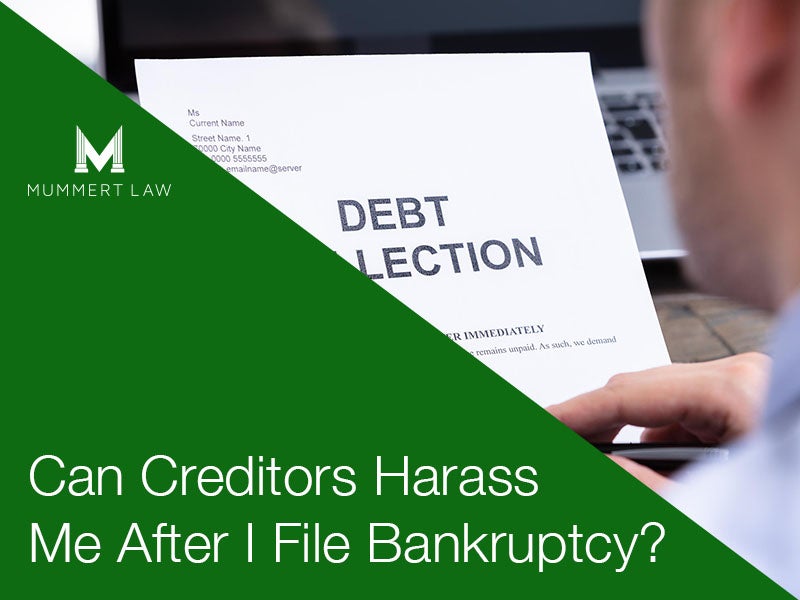
Bankruptcy offers a solution to financial problems, allowing you the possibility to get back on track and create a fresh start. But once you file, you may be asking yourself various questions, including, “Can creditors harass me after I file for bankruptcy?” Generally, creditors cannot continue to contact you regarding your debts after filing for bankruptcy, though there are exceptions.
The Automatic Stay
Right after you file for bankruptcy, an automatic stay is usually imposed.
What is an Automatic Stay?
An automatic stay briefly prevents collection agencies, creditors, government entities, and others from tracking down debtors for the money you owe. Therefore, creditors can’t contact you upon filing to collect your debt, such as credit cards and other unsecured debts. The automatic stay will typically end at the close of the bankruptcy case or if the debts are discharged.
Exceptions to the Automatic Stay
There are several exceptions where creditors or agencies can collect pre-bankruptcy debts. Those include obligations associated with:
- Criminal cases
- Certain child support actions
- Specific eviction cases
Note – The automatic stay doesn’t apply to debts you incur after filing.
Requesting to Lift the Automatic Stay
A creditor may request that the bankruptcy court lift the automatic stay, but this typically only happens if:
- The creditor has collateral-secured debt (e.g., a house or car)
- The creditor could lose money if they’re forced to wait until the completion of the case
What Do You Do if Collection Agencies Violate the Automatic Stay?
If no exception or lift applies, and the court hasn’t ended or changed the automatic stay, then a creditor’s attempt to collect is often a violation of the order. The following are ways you can manage collection agencies who contact you about your debts.
1. Ensure your creditor list is complete and accurate when you file.
The clerk of court notifies any creditor that you list when you file that a bankruptcy petition has been filed. This list lets collectors know they cannot call you or attempt to collect the debt without permission from the US Bankruptcy Court.
2. Inform the collector that you’ve filed for bankruptcy.
Often, creditors are unaware of your case, and this step alone will typically cause them to correct their violation. Also, share with your creditor if you’re working with an attorney. They should make any future communication with your lawyer instead of you.
3. Report the actions to the bankruptcy court.
Notify the bankruptcy court if the collection agency doesn’t stop and correct their violation. The court could sanction the agency if the collector’s actions were willful. The action is deemed willful if:
- The order was in place and violated
- The creditor knew of the filing and ignored the court’s order or failed to take corrective action upon learning of the case
- The collection agency acted with intent
4. File a lawsuit against the creditor.
If the collection agency continues to violate the automatic stay, it could also violate other state or federal laws. You can file a separate lawsuit to obtain potential penalties or damages.
If you are considering filing bankruptcy or have already filed and are being contacted by creditors, Mummert Law can help! We are available for a consultation. We’ll sit down together, evaluate your position, and determine how to proceed. So don’t go it alone when it comes to bankruptcy. Make your appointment with Mummert Law today!
-
Chapter 11, Subchapter V Bankruptcy

Filing Chapter 11 bankruptcy allows businesses to remain open and in operation while repaying creditors over a set period. However, pursuing this route is generally too expensive and complicated for most small business owners. Therefore, the Small Business Reorganization Act created Subchapter V to eliminate numerous Chapter 11 requirements. Thus, the addition makes reorganization bankruptcies more attainable for small businesses.
Filing for Bankruptcy as a Business Owner
There are several different bankruptcy options to seek debt relief if you’re a business owner. You can consider filing for Chapter 7 or Chapter 11 bankruptcy.
Note – If you run your company as a sole proprietorship, you can file Chapter 13 in your name and include your business debts in your plan.
Chapter 7 bankruptcy is known as “straight bankruptcy.” It aims to eliminate most, if not all, of your debt in exchange for your property. You’ll be obligated to sell your business assets in their entirety, pay creditors, and close your business. However, you’ll be debt-free.
Chapter 11 bankruptcy is known as “reorganization bankruptcy,” typically involving organizations, small businesses, corporations, or partnerships with a great deal of debt. You can remain open while you negotiate payment plans with your creditors.
What Is Subchapter V?
Subchapter V was added to Chapter 11 of the US Bankruptcy Code and went into effect in 2020. The subchapter was intended to make bankruptcies involving reorganizations more accessible for small businesses.
Who Can Qualify for Subchapter V?
To qualify for Chapter V bankruptcy, businesses must:
- Engage in business or commercial activities
- Ensure their unsecured and secured debts don’t exceed $2,725,625
- Have a minimum of 50% of business debt result from business activities
- Not include debt owed to company insiders
Note – You don’t qualify for Chapter V if your primary business activity is owning and operating a single property.
Advantages of Subchapter V
Subchapter V has many advantages, including removing many Chapter 11 requirements. The following is a list of benefits associated with filing for this subchapter.
- Eliminating the absolute priority rule
Absolute priority is a rule in corporate bankruptcies that determine what order of payment will go to creditors and shareholders. For example, senior creditors are paid before junior creditors. However, there isn’t an absolute priority rule when filing Subchapter V. - Remaining open operationally
Similar to the traditional Chapter 11, you’ll be able to keep your business open while repaying creditors
Note – While on the plan, you’ll have to pay your unsecured creditors the total amount of your disposable income. - No disclosure is required
- Installments of expenses paid
Instead of paying the administrative expenses in their entirety, you can settle your costs in installments. - Plan exclusivity
The debtor alone may file Subchapter V, and there isn’t an exclusivity period expiring after a certain period. - Reduced administrative expenses
- Increased protection of the automatic stay
An individual may file a second case within two years of the prior case, staying the actions of creditors pursuing the debtor. - Easier counsel retention
- There is no vote required to confirm the plan
The debtor can establish a cramdown plan with no approval from creditors. - Modification of specific mortgages
- Post-confirmation plan alterations
After confirmation, only the filer may modify the plan. - The discharge
The debtor can obtain a discharge on the effective plan date, given consensual confirmation provisions. - No limits in the modification of motor vehicle loans
Disadvantages of Subchapter V
While there are numerous advantages to filing Subchapter V, there are several disadvantages, including:
- Limited eligibility, as stated earlier
- Plan deadlines where the individual has 90 days to file a plan
- Remedies upon plan default, which says the program must provide appropriate corrections if payments aren’t made
- Limits on cash collateral use
- Mandatory trustee appointment
- Required status conference
- Dedicated projected disposable income to pay creditors
Subchapter V simplifies Chapter 11 for small businesses. But the process can still be complex. A knowledgeable lawyer can help you thoroughly understand the proceeding and ensure you achieve the greatest possible outcome. At Mummert Law, we’re available for a consultation, at which time we’ll sit down together, evaluate your position, and determine the best way to proceed. So don’t go it alone when it comes to bankruptcy. Make your appointment with Mummert Law today!
-
Choosing The Right Bankruptcy Lawyer
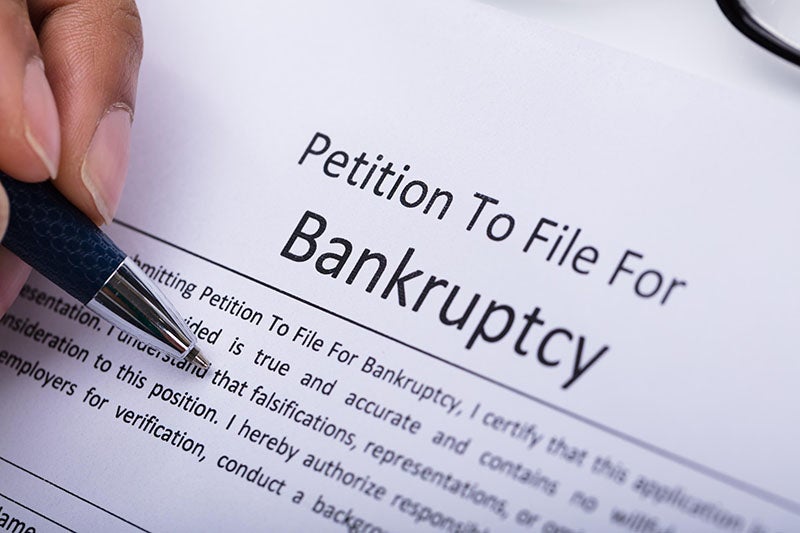
Filing for bankruptcy can be distressing, emotional, and complex, and it can also be a time-consuming undertaking. Moving through the process of seeking debt and financial hardship relief can take months or years to accomplish. However, a knowledgeable bankruptcy lawyer can help make all the difference. Their understanding of the legalities can simplify the approach, give you peace of mind, and help you avoid problems throughout the process. But it’s vital to choose the right lawyer for you!
What Is Bankruptcy?
Bankruptcy helps debtors relieve financial stress and problems that they may face. Typically, consumers file for Chapter 7 or Chapter 13 bankruptcy, designed to give debtors a fresh start. On the other hand, businesses and organizations can file for Chapter 7 or Chapter 11 bankruptcy. Bankruptcy lawyers aim to assist individuals and companies throughout the filing process.
What Are Bankruptcy Lawyers?
Bankruptcy lawyers typically specialize in consumer or commercial bankruptcy. Both transactional and litigation affairs are involved with bankruptcy practices.
Benefits of Hiring a Bankruptcy Lawyer
A knowledgeable bankruptcy lawyer can significantly impact filing and your overall achievement of debt relief because they:
- Understand the legal process
- Can improve your chances of success
- May help you save money over time
- Provide you with peace of mind
- Can assist with avoiding problems throughout the process
- Can help you keep real estate or assets that you own
- Make a complicated process easier for you
However, picking the right attorney to experience the above benefits is vital.
Choosing the Right Bankruptcy Lawyer
How do you choose which attorney is best suited for your situation? You can begin by following these steps:
1. Look at reviews
Today’s consumers often rely on reviews before making any purchasing decision. So, as you seek a bankruptcy lawyer, consider reviewing reviews for attorneys in your area.
The AVVO rating evaluates an attorney’s background, reveals state bar association information, and showcases details about other legal professional organizations. You can utilize this as a research tool when looking for reviews.2. Ensure they have experience in business and financial matters
Finding a bankruptcy lawyer with extensive knowledge and a considerable background in bankruptcy law, business, and financial matters is critical. These attorneys will have an in-depth understanding of the bankruptcy process. They will be able to best assist you with providing reliable consultation. They’ll also be able to keep you on track throughout the proceeding.3. Participate in a consultation
Most law firms and attorneys provide free consultations. These meetings will allow you to ask questions and examine if you and their team are a good fit. This consultation may be your first chance to speak with the bankruptcy lawyer. You’ll be able to determine whether you believe they can help you and your family find relief. In addition, notice whether they discuss various alternative resolutions, as they should present the most beneficial way to overcome your financial situation.4. Take note of their passion or energy
A bankruptcy attorney who is passionate and focuses their energy on helping you find financial relief is critical to the positive achievement within your case. And don’t be hesitant to ask why they chose to specialize in financial or bankruptcy law. Consider looking for a connection with their purpose and why they aim to help you and your family.5. Make sure they take the time to listen and understand you and your situation.
Every bankruptcy case is unique. And walking through the process can be distressing and emotional. A lawyer who hears and understands you can help ensure you feel confident and secure throughout the filing process. In addition, you’ll have a great deal of contact with your lawyer. So, you must find one with whom you’re comfortable.The mere thought of filing for bankruptcy and finding a lawyer can be intimidating. We understand, and that’s why we’re here to help make your journey to achieving debt relief as easy as possible. At Mummert Law, we’re available for a consultation. At this time, we’ll sit down together, evaluate your position, and determine the best way to proceed. So don’t go it alone when it comes to bankruptcy. Make your appointment with Mummert Law today!
-
Bankruptcy And Wage Garnishment
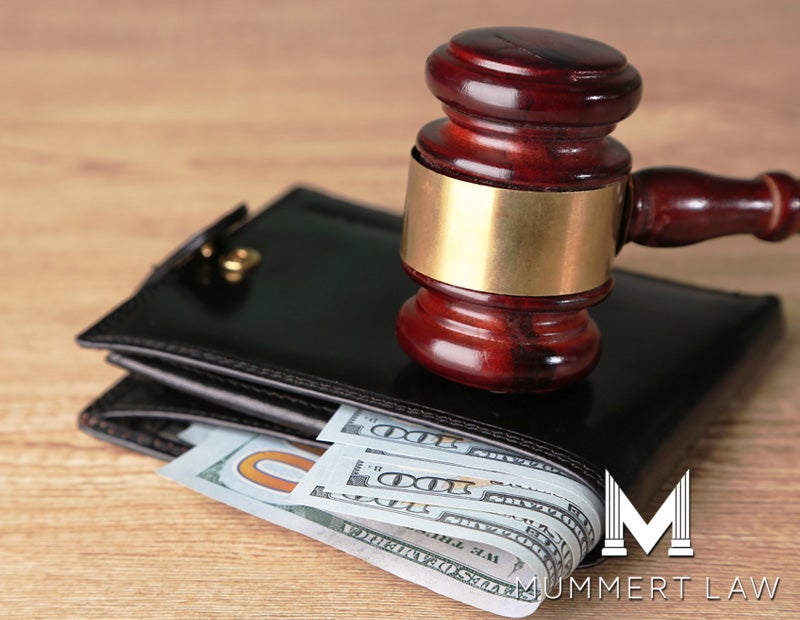 Financial situations are unique, complicated, and can be overwhelming. Sometimes, if your debts go unpaid long enough, a creditor can garnish your wages. But what is wage garnishment? And can you still file for bankruptcy after your wages have been garnished?
Financial situations are unique, complicated, and can be overwhelming. Sometimes, if your debts go unpaid long enough, a creditor can garnish your wages. But what is wage garnishment? And can you still file for bankruptcy after your wages have been garnished?The short answer is that many people file Chapter 7 and Chapter 13 Bankruptcy to either stop or prevent a wage garnishment.
Wage Garnishment Defined
A creditor can sue you over unpaid debt. Typically, they’d need to obtain a money judgment against you, which is a court-issued document stating the creditor won the lawsuit. A money judgment is entered if you don’t respond to the initial suit, which is known as a default judgment, or after a trial and the Court rules in favor of the creditor. In Maryland, you have 10 days to pay the judgment. If you don’t pay the judgment, many creditors will then garnish 25% of your income from your wages, as well as attach your bank account or put a lien against your property.
Wage garnishment is when a creditor files a request to have your employer withhold or deduct part of your wages to begin paying back your debt. The types of debt that a creditor can collect through wage garnishment include:
- Credit card debt
- Personal loans
- Taxes
- Medical bills
Note – While you are allowed to oppose the garnishment, generally speaking, there is no defense in State Court of I cannot afford the garnishment. Also, this wage garnishment is not the same as attachment of your wages for unpaid child support or alimony.
Bankruptcy and Wage Garnishment
Filing for Chapter 7 or 13 Bankruptcy will stop your wage garnishment (except for child support or alimony). In addition, upon filing for bankruptcy, a court-ordered automatic stay stops the majority of civil lawsuits brought against you. It also eliminates most collection actions against your property.
What is an Automatic Stay?
An automatic stay briefly prevents collection agencies, creditors, government entities, and others from collecting on the money you owe them.The automatic stay will typically end at the close of the bankruptcy case, statutory code provision that automatically terminates the stay, or an order terminating the stay.
A creditor may request that the bankruptcy court lift the automatic stay, but this typically only happens if:
- The creditor has collateral-secured debt (e.g., a house or car)
- The creditor could lose money if they’re forced to wait until the completion of the case
- To allow a creditor to continue with a divorce or other domestic proceeding
Chapter 7, Chapter 13, and Wage Garnishment
Chapter 7 Bankruptcy
A stop will be put on your wage garnishment when you file for Chapter 7 Bankruptcy (otherwise known as wage attachment). If you successful complete the Chapter 7 and a discharge is entered against that debt, the creditor will not be able to garnish your wages anymore.Note – Child support, certain taxes, and student loan debts aren’t dischargeable through Chapter 7 Bankruptcy. You are also required to continue to pay your child support and alimony while in bankruptcy.
Chapter 13 Bankruptcy
When filing for Chapter 13 Bankruptcy, you’ll pay your creditors, including the ones garnishing your wages, through payment plans. At the end of the Chapter 13 case, the debt should be discharged and the creditor will not be able to have your employer withholding income to satisfy the debt.Note – As long as you’re complying with your Chapter 13 three-to-five-year repayment plan, your garnishments will stop. After that, however, the court can decree that the repayment plan be fulfilled by garnishing wages.
Wage Garnishment and How to File for Bankruptcy
At the Mummert Law Firm, we assist debtors in stopping wage garnishments. We will meet with you, discuss your financial circumstances, and propose the best course of action, inside and outside of bankruptcy.
If you elect to file bankruptcy, we will assist you in obtaining the information to prepare the Bankruptcy Petition, Schedules, and Statements (approximately a 50+ page documents). Once we file bankruptcy, we will notify the Court that entered the judgment and garnishment, the creditor seeking the garnishment, and your employer that an Automatic Stay has been entered on your behalf. Further, we will notify everyone that if they continue to collect the debt, that person could be subject to Contempt of Court for violating the Automatic Stay.
Finances are complicated, and you could be facing crushing debt and wage garnishment. Creditors can seek to collect on credit card debt, personal loans, taxes, and medical bills through your wages. But filing for bankruptcy can end your wage garnishment. However, don’t go it alone when it comes to finding financial relief. If you are facing wage garnishment, Mummert Law can help! We are available for a consultation, at which time we’ll sit down together, evaluate your position, and determine the best way to proceed. So make your appointment with Mummert Law today!
-
Medical Debt in Bankruptcy
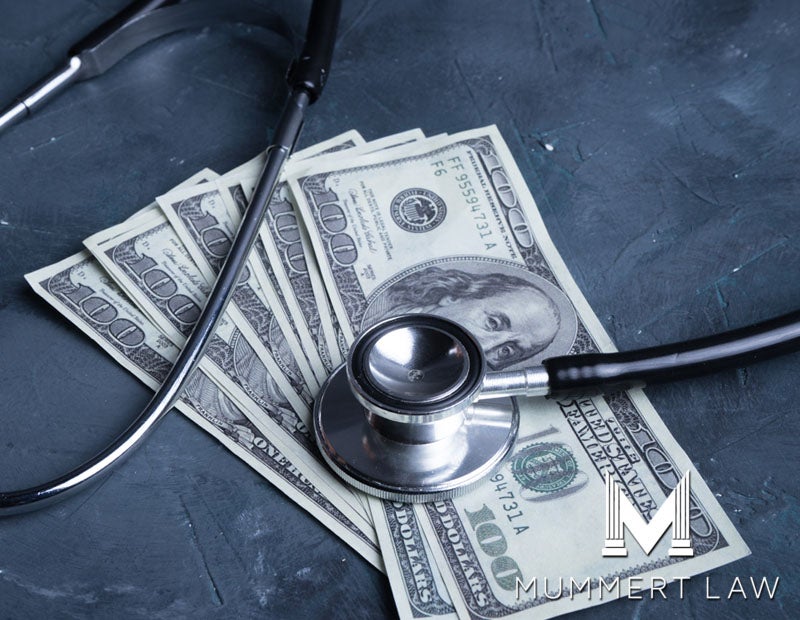 One of the foremost reasons individuals file for bankruptcy is because of medical debt. Why? Because planning your medical future can be difficult, if not impossible. Unexpected illnesses or other medical emergencies are a fact of life. Although we are grateful when we survive an emergency, we are often shocked by how much the medical issue costs.
One of the foremost reasons individuals file for bankruptcy is because of medical debt. Why? Because planning your medical future can be difficult, if not impossible. Unexpected illnesses or other medical emergencies are a fact of life. Although we are grateful when we survive an emergency, we are often shocked by how much the medical issue costs.Medical providers are quick to pursue their debt. They usually only send one invoice and then refer you to a debt collector. The debt collector will then send letters as well as call you, early and often. Suppose you do not agree to their terms. In that case, they will put derogatory information on your credit report and possibly refer you to an attorney to file a lawsuit.
One way to bring relief is to consider filing bankruptcy to eliminate or reduce your medical bills.
About Medical Debt
Medical debt is money owed to doctors, hospitals, or other medical providers or organizations. This type of money owed is defined as unsecured debt. Unsecured debts are a loan (i.e., money owed) and not backed by collateral (e.g., a house or vehicle). However, if you are sued in court over the debt, the money judgment can is often attached to collateral like your house.
When you’re overwhelmed with medical debt, there may be various options available to reduce it. One option is to talk to the provider about a payment plan. However, many providers want an immediate payment to satisfy the whole debt. Many consumers will turn to credit cards to pay the medical bills, leading to a larger monthly payment on the obligation. Other consumers will refinance their house to pay the bill. In Maryland, consumers should never withdrawal money or take a loan from their retirement account. This asset is 100% protected, and medical providers cannot attach it or garnish it to obtain money to pay the bill.
Bankruptcy may also be a debt relief option to consider.
Bankruptcy and Medical Debt
Bankruptcy is a legal process consisting of federal rules and laws, offering a solution to financial problems for businesses and individuals.
Medical Debt, Chapter 7, and Chapter 13
One challenge you may be facing is deciding which chapter of bankruptcy to file when you’re dealing with medical debt. Your situation and the ability to meet specific qualifications will help you determine which way to file. Let’s briefly look at Chapter 7 and Chapter 13 bankruptcy.
Medical Debt and Chapter 7 Bankruptcy
Chapter 7, known as “straight bankruptcy,” aims to liquidate most, if not all, of your debt in exchange for your property, including your medical bills. All medical bills for services provided before bankruptcy filing should be discharged even if the service provider has not submitted an invoice. A provider can still collect against any health insurance, but any co-pay or uninsured amount will discharge. The only exception is if the creditor can prove an exception to discharge like a fraud.
To be eligible to file for Chapter 7 bankruptcy, a qualified attorney will examine your income, expenses, assets, and liabilities. Suppose your household is either below median income for Maryland, or you pass the means test. In that case, you qualify for Chapter 7 income from an income point of view. We also examine to make sure there are no assets available for a Chapter 7 Trustee to sell or liquidate.
Medical Debt and Chapter 13 Bankruptcy
Chapter 13, known as the repayment/reorganization plan, is a way to reorganize your debt. As a result, you’re able to keep your valuable property that could have been sold in Chapter 7 and pay off what you can over time. You’ll be placed in a three to five-year payment plan during which you’ll pay your debts according to the Bankruptcy Code priority, liquidation analysis, and disposable monthly income analysis.
However, because medical debt is an unsecured or lower priority debt, you’ll pay those last. On the other hand, first, you’ll have to pay priority debt, including domestic support obligations, administrative expenses, and taxes.
Eligibility for Chapter 13 is determined by the amount of secured and unsecured debt you are currently carrying. You must also be able to make your monthly payments to creditors. Upon completing your Chapter 13 plan and entering the Chapter 13 discharge, you will eliminate your medical debt.
If you have medical debt and are considering filing for bankruptcy, Mummert Law can help! We are available for a consultation, at which time we’ll sit down together, evaluate your position, and determine the best way to proceed. So don’t go it alone when it comes to bankruptcy. Make your appointment with Mummert Law today!
-
Chapter 11 Business Bankruptcy
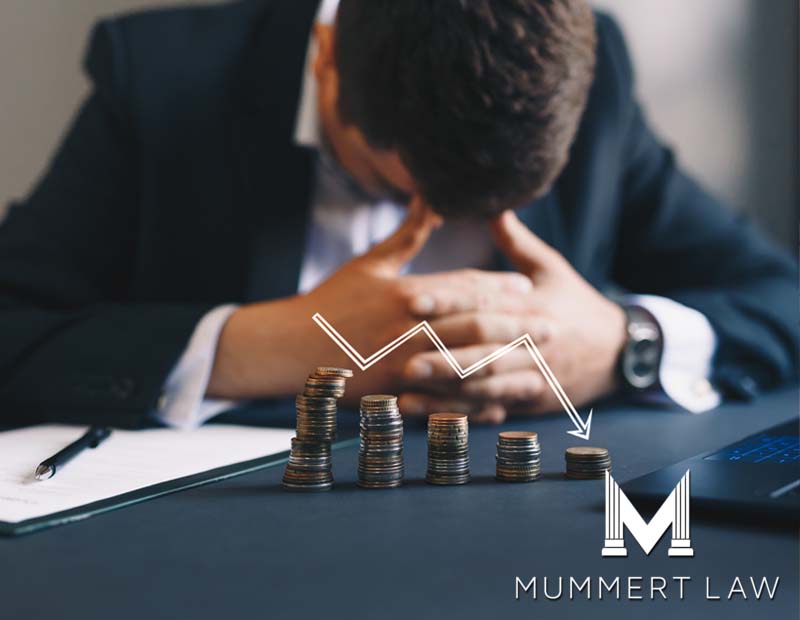 Bankruptcy is a legal process that consists of federal rules and laws. This process offers financial solutions for businesses and individuals who owe more debt than they can pay. Therefore, they get a chance to get back on a healthy financial track. The majority of cases are filed under Chapter 7, Chapter 11, and Chapter 13 of the Bankruptcy Code.
Bankruptcy is a legal process that consists of federal rules and laws. This process offers financial solutions for businesses and individuals who owe more debt than they can pay. Therefore, they get a chance to get back on a healthy financial track. The majority of cases are filed under Chapter 7, Chapter 11, and Chapter 13 of the Bankruptcy Code.Filing Chapter 11 allows businesses to remain open and in operation while repaying creditors over a set period.
Chapter 11 Bankruptcy Further Defined
Chapter 11 bankruptcy is known as “reorganization” that typically involves organizations, businesses, corporations, or partnerships with a great deal of debt. Small companies or individuals can also file. Chapter 11 gives businesses the time and opportunity to reorganize their debts through a plan of restructuring. This plan can provide the filer a fresh start.
The Plan of Restructuring
Within this plan, the debtor states how they endeavor to reorganize or liquidate their assets over time. Affected creditors may vote on this plan. If the court receives the necessary votes and the legal requirements are satisfied, they can confirm the plan. The debtor is also subject to fulfilling the terms of their obligations under their plan of reorganization.
There are several options available to debtors to restructure their business. For example, they can acquire loans under advantageous terms, giving new lenders priority on the organization’s earnings. They can also downsize to reduce expenses or renegotiate debts.
Chapter 11 Vs. Chapters 7 or 13
Chapter 7 Vs. Chapter 11
The entity that files under Chapter 11 doesn’t have to liquidate its assets and remains in control of its operations. It gives the business time to reorganize and to obtain a discharge of previous obligations. However, Congress does not let a corporation, limited liability company, or any other type of business organization obtain a discharge in Chapter 7. Rather, a business that files Chapter 7 is putting up the white flag of surrender.
Chapter 13 Vs. Chapter 11 (non-sub Chapter V)
Although Chapters 11 and 13 allow dismissing debts, they have different costs, eligibility, and completion times. Any entity can file Chapter 11 with no specific debt limit or required income. Chapter 13 can only be filed by an individual and not a business (inc., LLC, LP, etc.). Chapter 13 also has predetermined debt limits. Chapter 13 also involves having a trustee appointment that manages the distribution of income and potential liquidation of assets to creditors, where a standard voluntary Chapter 11 starts without a Trustee.
Advantages of Filing Chapter 11
One of the most significant advantages to filing Chapter 11 is that the debtor typically remains in possession (as a debtor-in-possession) of their business throughout the process and no Trustee. As a result, they may continue to operate the company and can, pending court approval, even borrow money. Therefore, they can continue to generate cash flow to assist in their repayment process.
The court also issues an order that will keep creditors at a distance. Creditors are often supportive of Chapter 11 because they stand a solid chance of recouping their money throughout the repayment plan or wish to renegotiate their debt.
Disadvantages of Filing Chapter 11
Filing for Chapter 11 can be a lengthy and expensive process. It’s one of the most complicated bankruptcy chapters and has substantial more costs (attorney’s fees, court costs, quarterly payments, etc.). Additionally, the bankruptcy court must approve the reorganization plan. This plan must be achievable so that the business can pay off its debts. Therefore, only after great thought and consideration should an organization pursue filing Chapter 11 bankruptcy.
It’s important to note that a business can’t make certain decisions without the approval of the courts, including:
- Sale of assets (other than inventory)
- Beginning or ending a rental agreement
- Ceasing or increasing business operations
Filing for Chapter 11 bankruptcy can provide organizations and individuals relief from their debt burdens while keeping them open for business. However, the process can be complicated, making legal counsel vital before filing the petition. Mummert Law has many years of experience handling bankruptcy cases for clients. Call today, and let’s see what course of action is best for you. Don’t go it alone when it comes to finding financial support for you or your business.
-
Who Will Know If I File for Bankruptcy?
 Record numbers of new bankruptcy cases across the state are on the rise. And filing for bankruptcy can come with lots of questions and concerns. One of those chief concerns is who will know if you file for bankruptcy?
Record numbers of new bankruptcy cases across the state are on the rise. And filing for bankruptcy can come with lots of questions and concerns. One of those chief concerns is who will know if you file for bankruptcy?Bankruptcy Defined
Bankruptcy is a legal process consisting of federal rules and laws, offering a solution to financial problems for businesses and individuals. For example, when someone owes more debt than they can pay, bankruptcy assists them by liquidating their assets to clear the debts or establishing a payment plan. It allows individuals and businesses to get back on track with healthy finances and create a fresh start.
The majority of cases are filed under Chapter 7, Chapter 11, and Chapter 13 of the Bankruptcy Code. We’re going to focus on Chapter 7 and Chapter 13.
Chapter 7 Bankruptcy vs. Chapter 13 Bankruptcy
Chapter 7, known as “straight bankruptcy,” aims to eliminate most, if not all, of your debt in exchange for your property; however, most Chapter 7 debtors keep all of their property. On the other hand, Chapter 13, known as the “wage earners” plan, is a way to reorganize your debt and catch up past due mortgage and car payments. As a result, you’re able to keep your valuable property, your house, cars, and pay off what you can over time. Both of these bankruptcy filings are designed to give debtors a fresh start.
For more insight into the differences between Chapter 7 Bankruptcy and Chapter 13 Bankruptcy, click here.
Who Will Know if I File for Bankruptcy?
The filing of bankruptcy will create a public record. The Petition, Schedules, Statements, and other required documents will be maintained at the US Bankruptcy Court for your jurisdiction. Others will also be notified as required by Federal law.
Creditors
The clerk of court notifies that a bankruptcy petition has been filed to any creditor (an organization or individual that you owe money to) that you list when you file. This notice is not a bad thing; rather, it lets creditors know they are not allowed to call you or attempt to collect the debt without permission of the US Bankruptcy Court.
Loan Co-Signers
Any individual that you’ve co-signed a loan with will be informed that you’ve filed for bankruptcy. This places the co-signer on notice that you may not be responsible for the debt anymore.
Bankruptcy Trustee
The US Bankruptcy Court will automatically assign a Trustee to review your case. In Chapter 7, the Trustee reviews your Petition, Schedule, Statements, and documents provided to them to confirm that a) you are not committing fraud and b) that you have no assets to liquidate for the benefit of the creditors. An experience bankruptcy attorney will know whether you need to be concerned by either of these issues. A Chapter 13 Trustee also reviews your documents to determine the appropriate amount to repay your creditors.
Credit Bureaus
Federal law requires the US Bankruptcy Court to notify the three agencies of your bankruptcy. This information remains on your credit report for 10 years, which matches the average length of time non-payment of debt remains on your credit report. At Mummert Law, we can answer your question how this information will impact you obtaining new credit.
Your Employer or Potential Employer
Employers are not officially informed when you file for bankruptcy unless:
- The bankruptcy filing stops a wage garnishment
- Your employer is listed as a creditor, and you owe them money
- You are filing Chapter 13, requiring a payroll deduction order for plan payments
In addition, your current or prospective employer would need to know where to look for your information on a public record.
Note – your employer or prospective employer is prohibited by law from discriminating against you due to your bankruptcy on record. If you lose your job or are denied employment because of discrimination, contact a bankruptcy attorney immediately.
If you have questions about bankruptcy or are considering filing, Mummert Law can help! We are available for a consultation, at which time we’ll sit down together, evaluate your position, and determine the best way to proceed. So don’t go it alone when it comes to bankruptcy. Make your appointment with Mummert Law today!
-
Can I Keep My Car If I File for Bankruptcy?
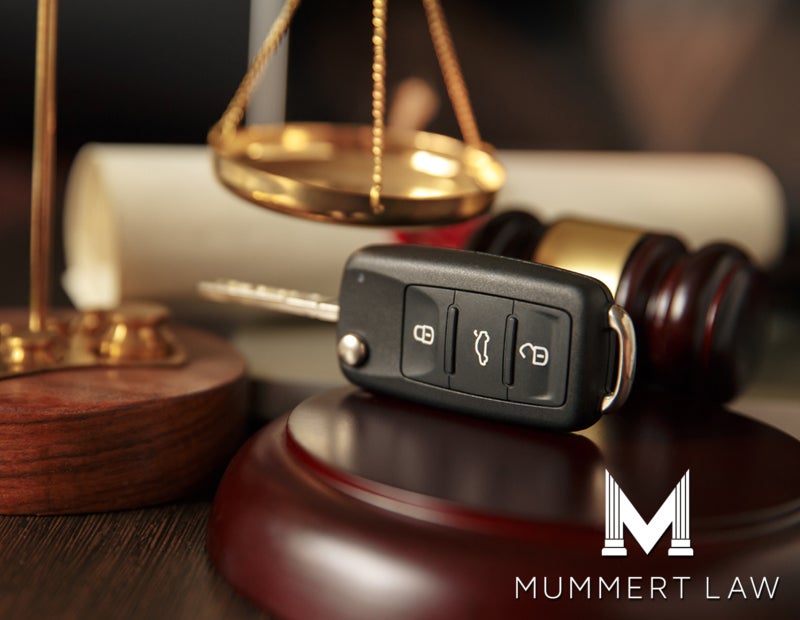 Besides protecting their homes, people are most concerned about keeping their cars when filing for bankruptcy. So, we’ll share with you what protecting your vehicle looks like when filing either Chapter 7 or Chapter 13 bankruptcy.
Besides protecting their homes, people are most concerned about keeping their cars when filing for bankruptcy. So, we’ll share with you what protecting your vehicle looks like when filing either Chapter 7 or Chapter 13 bankruptcy.Bankruptcy helps offer a financial solution to manage better or clear overwhelming debt. And deciding which chapter to file while protecting your car will look different, depending on answers to a few questions. For example, are you behind on your payments? How much equity is in your vehicle? Will you be able to continue to pay for your car in the future?
If You Must Keep Your Car – Chapter 7 Bankruptcy
Chapter 7 bankruptcy aims to eliminate most, if not all, of your debt in exchange for your property. Protecting your car in Chapter 7 will depend on whether you’re behind and if your equity is exempt. If your vehicle is worth more than what you owe, or you own it outright, you will need to protect it with a bankruptcy exemption.
Vehicle Exemption
To protect certain kinds of property you have equity in, like vehicles, you’d have to apply for an exemption. An exemption permits you to keep specific property so that you can begin with a fresh start after bankruptcy.
Maryland has property exemptions to include insurance, pensions, personal property, tools of the trade, and wages. However, the state doesn’t have a vehicle-specific exemption. Nor does Maryland bankruptcy law permit debtors to choose federal exceptions (e.g., a federal vehicle exemption). But, the state does have a wildcard exemption that offers filers flexibility, and you can apply it to vehicles. Note – to use a state exemption, Maryland requires individuals that file to have lived in the state for at least two years.
The Wildcard Exemption
The Maryland wildcard exemption includes an exemption:
- Up to $6,000 in cash or other property
- Up to $5,000 in property of any kind
You can apply one or both of these exemptions to your vehicle. So, for example, if you need $3,000 of your cash property exemption to cover your tax refund, you can use the remaining $3,000, plus the entire $5,000 in personal property to protect your car, totaling $8,000. Or you can use the entire $11,000 exemption for your vehicle. At Mummertlaw, we are experienced in protecting your cars that have equity.
Are You Behind on Payments?
If your car is worth less than what you owe, you’ll have to keep making payments on it to keep it. Because your vehicle is probably collateral against the loan, the loan is a secured debt. And if you don’t pay the loan as previously agreed upon, the lender can repossess the car. Unfortunately, filing for bankruptcy doesn’t remove the lender’s lien, so you’ll have to continue paying off your car or pay for it a different way.
When you file for Chapter 7, you should be current on your car payments because there’s no mechanism to catch up on missed payments. You’ll have to create a new plan with the lender, or you’ll lose your vehicle. But you could redeem the car or reaffirm the debt to keep your vehicle.
Redeeming vs. Reaffirming
With Chapter 7, if you owe more than what your car is worth, you can redeem your car and own it outright. You can do this by paying the lender how much you owe on the vehicle or fair market value, whichever one is the least amount. There are lenders who will loan you money to redeem your car.
You can also reaffirm your vehicle, which means that you agree that this is a valid debt and that you owe your creditor a certain quantity of money. You will continue to pay on this debt even after your bankruptcy case ends. Therefore, the debt is essentially not part of the bankruptcy, and you won’t be able to discharge it.
Please note that reaffirmation leaves you with remaining debt after your bankruptcy, so proceed with caution. If you default on the loan at a later date, you’ll be liable for the balance. We will discuss this option before entering into this option.
If You Must Keep Your Car – Chapter 13 Bankruptcy
Chapter 13 bankruptcy allows you to reorganize your debt, making reasonable arrangements to pay off what you can over time. For example, suppose you have more equity in your secured assets than you can protect with your Maryland exemptions. In that case, you can reorganize through Chapter 13 rather than liquidate with Chapter 7.
With Chapter 13, you can:
- Stop a repossession
- Catch up on your car payment
- Possibly reduce your car loan
You can pay off your car through your repayment plan. You’d make that payment through your bankruptcy trustee, and they’d send a portion to your car lender. However, with Chapter 13, you’ll have to prove you can afford to pay what’s entitled to your creditors in a repayment plan.
In a Chapter 13 bankruptcy, you can protect your vehicle even if your equity is too much to cover in Chapter 7. To do this, you’ll have to pass the liquidation test.
The Liquidation Test
You’ll need to ensure your Chapter 13 payment plan pays the same amount of money to the creditors that they’d receive in Chapter 7. This is known as a liquidation test. Unsecured creditors, such as those you pay your car loan to, must be paid as much as they would in Chapter 7 liquidation.
Cramdown your Car Loan
If you have had your car loan for 910 days or more, and you owe more than your car is worth, you may be eligible to cramdown your car loan. This is also an option for people that have a high-interest rate on their car loans.
When You Can’t Keep Your Car with Chapter 13
There are a few instances where you might not be able to keep your car under Chapter 13:
- If you have more equity in your vehicle, then you can protect with an exemption
- You have an extremely high car payment and high interest
- You’re paying for a second vehicle that isn’t necessary
If you have questions about bankruptcy or are considering filing, Mummert Law can help! We are available for a consultation, at which time we’ll sit down together, evaluate your position, and determine the best way to proceed. So don’t go it alone when it comes to bankruptcy. Make your appointment with Mummert Law today!
-
Five Reasons to Settle Your Divorce Through Mediation
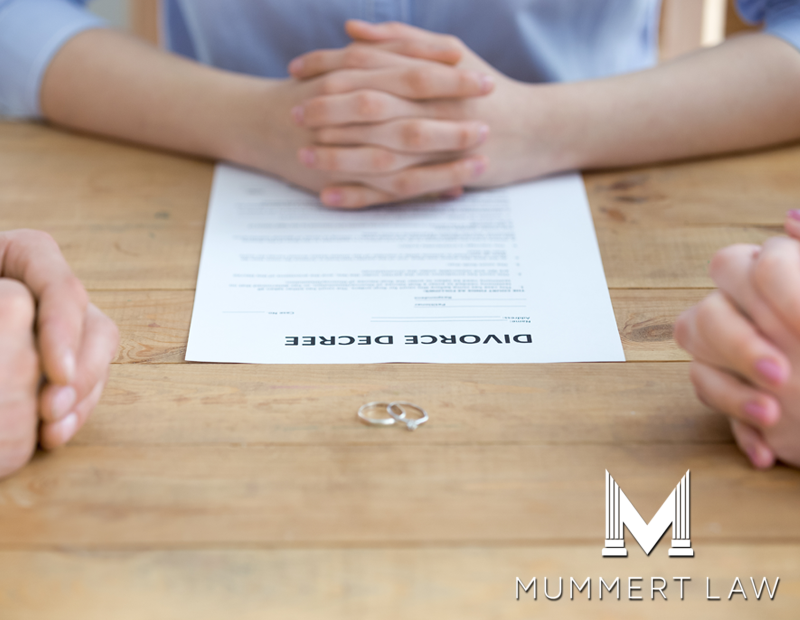
Getting divorced is never a pleasant situation. We’ve all heard horror stories about the fights and unexpected outcomes. As a lawyer, I’ve seen my share of ugly divorces. The battles don’t surprise me anymore. Couples can fight over the kids, or the Kitchen Aid mixer, and all with the same passion. I’m a proponent of using the dignified approach of mediation to dissolve a marriage. Here are some great reasons to use a mediator to guide you through the decisions involved in an amicable divorce.
Save Money by Using Mediation
In a traditional divorce, driven by lawyers who have been hired by each party, the fees can be sky-high. In most cases, each party pays their own lawyer, and the price tag may be shocking. As the two lawyers each argue and negotiate back and forth on behalf of their individual clients, the costs continue to climb. Did you know the cost of a traditional divorce can reach five, or even six figures before it’s complete? Everybody saves money by working through mediation.
Mediation Saves Valuable Time
Over and above time requirements set by the state, traditional divorce cases are lengthy. In Maryland, it can take eighteen to twenty-four months, or longer. Separating through mediation is considerably faster, and it’s possible for eligible participants to be divorced in around sixty days. Taking more time doesn’t usually shed light on anything new. It just drags the proceedings out and prolongs the healing process when you’re ready to get on with your life.
Mutual Agreement Through Divorce Mediation
During mediation, both parties can review each other’s documents, and negotiate an informed settlement with the help of the mediator. Documentation for financial information can be requested by the individuals themselves, instead of having to pay a lawyer to request them. The beauty of this arrangement is people are more likely to have confidence in the documents submitted, since they are done so voluntarily. Since both parties have a voice in the solution, enforcement issues are less likely to come up later.
Be Kinder to Your Children… Choose Mediation
Divorce is especially hard on children. As stressful as it may be for adults, kids often feel emotions they can’t put into words. Mediation is a great way to work together to bring about the best outcome, especially for your children. Co-parenting is an essential part of being a divorced parent. Going through the mediation process creates the best chance for the two parents to work together in the future.
Control the Outcome of Your Divorce Through Mediation
When a divorce winds up in court, there’s no way to know what the outcome is going to be. It makes life difficult when it comes to planning for the future. A lawyer driven divorce can turn lives upside down without warning. A mediated divorce brings an agreed-upon outcome, so the transition to becoming a divorced family is much more peaceful. It’s also interesting to note the court is likely to order mediation anyway, even if you’ve already paid hefty legal fees.
Who Can Be a Divorce Mediator?
Technically, anyone can be a mediator. To be a court appointed family mediator, he/she must be qualified through eighty hours of initial training, and an additional four hours a year of continuing educational training. Court appointed mediators are usually lawyers or mental health professionals. But lawyers who specialize in mediation bring added value to the table. Because they have experience in family law and have had a chance to interact with and observe a judge’s decisions in divorce cases, they have a better understanding of the process and risk of going to court.
Interested in Learning More About Mediation?
I am qualified through training, education, and conducting countless mediations in family law cases. I serve as a court-appointed mediator in family law. My education and training in high-conflict cases and working as a parent coordinator allows me to look at things from a better perspective. It’s rewarding when I help people refocus negative energy. Instead, I help them gain an appreciation for doing what is best for the family. I handle high conflict cases on a regular basis. I take great pride in working with people to reach an agreement both parties can agree to comply with. I enjoy helping families be as stress-free as possible when going through divorce.

